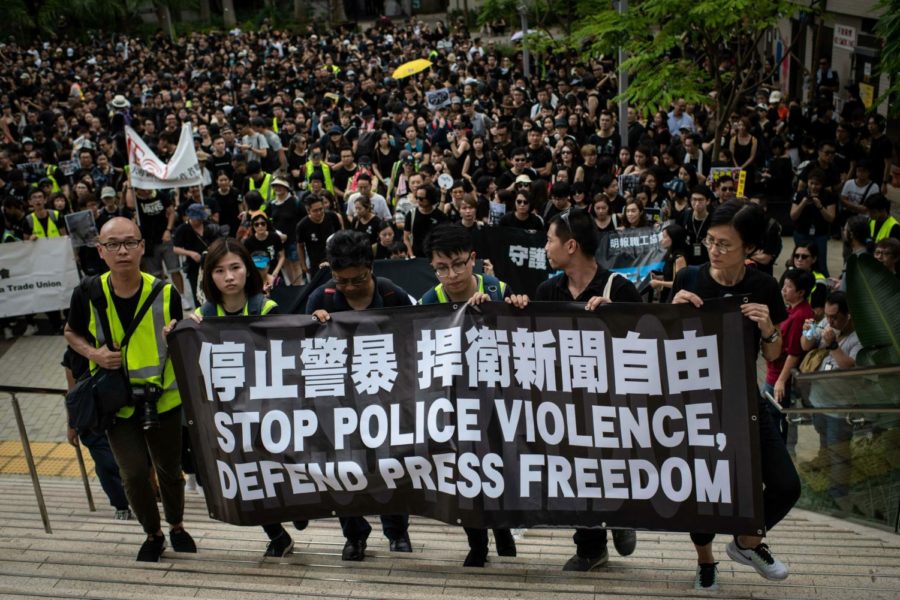Hong Kong Raid Leaves Free Press in Doubt
Nieman Foundation for Journalism at Harvard
Journalist trade unions and media groups call for free press in Hong Kong.
Police raided the office of the largest remaining pro-democracy media outlet in Hong Kong days before New Year’s eve, completing a year of efforts by the region’s government to curb free press and install strict security laws at the direction of Chinese officials. The early morning intrusion on Stand News, which lasted several hours and involved more than 200 officers from the police department’s national security office, culminated in the arrest of seven of the publication’s leaders and the seizure of almost $8 million of its assets.
Hours later, the site announced that it would cease all operations immediately. Their online post read, “Stand News’s editorial policy was to be independent and committed to safeguarding Hong Kong’s core values of democracy, human rights, freedom, the rule of law and justice.” Within a day, the media company’s website and social media pages went offline and its employees disbanded.
The seven arrested were charged with conspiring to publish seditious material. Hong Kong officials defended the operation, contending that the news site threatened national security with its “inflammatory” coverage of the city’s judicial system and “hateful” views towards the government.
John Lee, Hong Kong’s second-in-command, also accused the journalists of damaging press freedom by using their occupation as a disguise for illegal operations. “These are the bad apples who are abusing their position simply by wearing a false coat of media worker [sic],” he said in a news conference. “Professional media workers should recognize this, say no to these people and stand far from them,” he continued.
Just months earlier, Apple Daily, which was Hong Kong’s most prominent pro-democracy newspaper, was forced to close after police conducted a similar raid on its newsroom and arrested, among several others, Jimmy Lai, the publication’s founder. Mr. Lai was sentenced to 20 months in prison for his participation in a pro-democracy demonstration in December and now faces fresh charges of sedition that could keep him imprisoned for the rest of his life.
These actions by top Hong Kong officials are part of a larger campaign by the Chinese government to restore control of the city after its response to a bitter series of 2019 pro-democracy demonstrations garnered international scorn. In June 2020, China imposed a new security law that removed virtually all independence from Hong Kong’s once-impartial judicial system.
Under the new policy, Hong Kong’s chief executive, who is appointed by the Central People’s Government , can choose the judges that preside over national security cases. Chinese courts are also now responsible for interpretation of the law, giving Hong Kong courts little moderation power. The new security law claims to target terrorism and secession, but the vast majority of those arrested under it, including the seven Stand News employees, face accusations of writing or making statements interpreted as encouraging the independence of Hong Kong or calling for sanctions on China.
Apart from the broad damage to Hong Kong’s judicial system, the security law has far-reaching implications that extend to daily aspects of life for much of the city’s population. Some officials have warned that certain art works at Hong Kong’s M+ museum violate the security law, and lawmakers are expected to sign resolutions allowing the censorship of previously-approved movies and films. Speech therapists were arrested for publishing a book that depicted the Hong Kong police as aggressive wolves.
The law has sparked outrage among the international community. Legal experts reacted with horror as bail hearings for some defendants of security law charges lasted so long they were hospitalized for exhaustion. The influx of charges filed under the new law has overwhelmed Hong Kong’s courts, prompting its chief executive, Carrie Lam to propose the construction of a new ‘mega-courtroom.’ The United States responded with sanctions on Hong Kong and Chinese officials, and like some other countries, ended extradition agreements.
However, government officials have rejected accusations that the new law is problematic. In an October interview, Mrs. Lam said, “Hong Kong’s international reputation has suffered some damage because many foreign politicians, organizations and Western media have amplified the idea that the correct enforcement of the national security law is equivalent to suppressing human rights and freedom.”
But for many of the city’s citizens, Mrs. Lam’s reassurances ring hollow as headlines of lengthy sentences under the new law, including a three year sentence for a 20-year-old student accused of secession, make the news each day.
Angela Li ’24, who lives in Hong Kong, echoed this sentiment. “I’ve always viewed Hong Kong as different from mainland China in terms of its policies and the existence of free press,” Li said. “So now that the Chinese government is slowly encroaching on that right, I’m worried about losing that benefit.”
Li says the new security laws are making a noticeable impact in Hong Kong: “Whenever I go home and go on social media platforms, I find myself using them with an extra degree of caution, whether it be consciously or not.”






